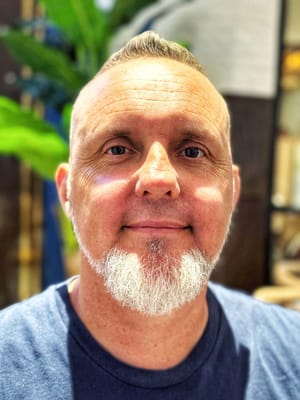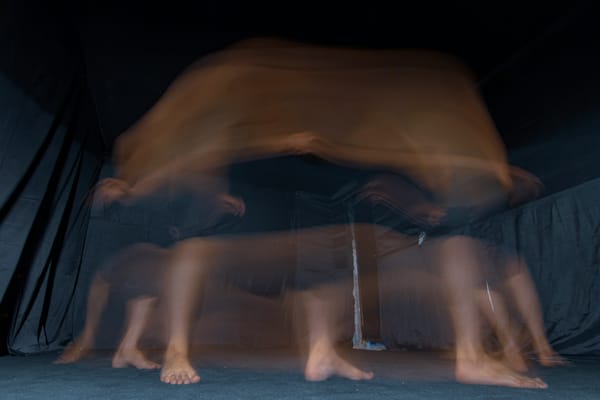In a world overflowing with optimisation frameworks and life-hacking strategies, I've found myself craving something different: not another system to perfect, but a compass to guide me home when I've wandered too far from myself.
Philosophy, at its core, was never meant to be confined to lecture halls or dense textbooks. The ancient Greeks saw it as philosophia – the love of wisdom – a practical discipline for navigating life's complexities with grace and meaning. This is the philosophy I've been seeking: not as intellectual entertainment, but as lived practice.
What follows isn't a manifesto of certainty. It's a map drawn from getting lost repeatedly, from stumbling and returning, from moments of clarity followed by long stretches of forgetting. I don't offer it from above the struggle, but from within it – as a fellow traveler who has found certain landmarks worth revisiting.
These four pillars have emerged not as ideals to achieve once, but as practices to return to, again and again. They form the quiet architecture that holds my life when everything else seems to be crumbling. Perhaps they might offer something of value on your own journey.
Pillar 1. Clarity – The Courage to See Clearly
Before any meaningful change, there must be the willingness to see.
Clarity isn't about having all the answers or perfectly defining who you are. It's about the radical honesty that emerges when you're willing to look beneath the roles you play and ask: What part of this life is authentically mine?
Most of us navigate through layers of inherited beliefs—about who we should be, what success looks like, how we're supposed to show up in the world. These stories often go unexamined for decades, quietly shaping our choices without our conscious participation.
Clarity asks us to pause. To notice. To gently peel back those layers and listen for the quieter truths we've buried beneath performance and expectation. It requires the courage to question not just what others have told us, but what we've been telling ourselves.
This pillar reminds me that before I can live differently, I must see differently – and that seeing clearly is itself a practice, not a destination.
Questions for Clarity:
- What beliefs am I carrying that I've never questioned?
- Where in my life am I performing rather than being?
- What truth am I avoiding seeing clearly?
Pillar 2. Coherence – The Integrity of Alignment
Once we begin to see with greater clarity, we face a choice: Will we align our lives with what we've seen, or continue living in contradiction?
Coherence is the bridge between insight and embodiment. It's the narrow space between what we claim to value and how we actually show up in our daily lives. It doesn't demand perfection, but it does require congruence – a life where inner and outer worlds speak the same language.
For me, coherence often manifests in small, seemingly insignificant decisions: the conversations I initiate or avoid, the boundaries I uphold or surrender, the choices I make when no one is watching. These moments reveal whether my stated values are genuine convictions or merely comfortable ideas.
It's remarkably easy to maintain a life that looks impressive from the outside while feeling hollow within. But if that appearance costs your integrity, your energy, or your peace, it's no longer coherence—it's survival disguised as success.
This pillar reminds me that how I live is what I truly believe. Everything else is just wishful thinking.
Questions for Coherence:
- Where are my actions misaligned with my deepest values?
- What am I tolerating in my life that violates my sense of integrity?
- What small adjustments would bring greater alignment between my inner and outer worlds?
Pillar 3. Resilience – The Wisdom of Remaining
Life doesn't unfold according to our philosophies or plans.
There are seasons where everything carefully constructed feels suddenly fragile. Where grief arrives uninvited. Where the future disappears into fog. Where familiar coping mechanisms no longer sustain us.
Resilience, as I've come to understand it, isn't about bouncing back quickly or powering through difficulty. It's about developing the capacity to be with life exactly as it is—especially when it's not what we hoped for or expected.
This pillar teaches me how to stay present when every instinct urges escape. To soften when I want to armor myself. To ask: What is this moment asking of me—not in theory, but in lived experience?
Philosophy matters most when things fall apart. That's when meaning becomes more than an intellectual exercise—it becomes essential to our survival and flourishing.
Questions for Resilience:
- Where am I resisting rather than meeting what is?
- What wisdom might this difficulty be offering that comfort never could?
- How might I cultivate presence rather than escape in challenging moments?
Pillar 4. Reflection – The Practice of Awakening
This final pillar weaves the others together into a living fabric.
Without reflection, we inevitably drift back into unconscious patterns. We begin living by habit rather than choice, reacting instead of responding, performing instead of becoming.
Reflection is how we stay in intimate relationship with our own lives. Sometimes it takes the form of structured practice—journaling, meditation, conversation with trusted others. Other times it's as simple as a walk in silence, a moment of presence while washing dishes, a question held gently without demanding an immediate answer.
Reflection isn't about endless self-analysis or criticism. It's about listening. Paying attention. Staying in conversation with what matters most when the world conspires to distract us with what matters least.
Without reflection, the other pillars gradually erode. With it, we continually remember who we are and who we're still becoming.
Questions for Reflection:
- What practices help me stay awake to my own life?
- Where have I gained insight that I've failed to integrate?
- What would I notice if I were paying closer attention?
The Spiral Path: Always Returning
I want to be clear: I don't move through these pillars in neat, linear fashion. There is no graduation, no final mastery. I revisit them constantly in an ongoing spiral of forgetting and remembering, of wandering and return.
Some weeks find me anchored deeply in coherence. Other times I'm crawling back to clarity after a long period of avoidance. Sometimes all I can manage is to hold onto resilience with both hands and breathe.
That's the beauty of philosophy as lived practice—it grows with you. It's not a framework to master once, but a rhythm to practice daily. It accommodates our humanity rather than demanding perfection.
So if you find yourself weary of optimisation culture and hungry for something with deeper roots—if you're seeking wisdom rather than techniques—perhaps these pillars might offer a point of orientation. A place to stand when everything else seems uncertain.
You don't need to have it all figured out.
You just need to keep returning. Eyes open. Heart honest. Life in hand.
The path is always waiting, ready to welcome you back, exactly as you are.
NEXT STEPS:
If these pillars resonate with you and you're seeking deeper guidance on your philosophical journey, I offer one-on-one philosophical coaching and counselling. Together, we can explore how these principles might illuminate your unique path and help you navigate life's complexities with greater clarity and purpose. CLICK HERE to learn more about working together to bring philosophy into lived practice.
Coaching Philosophia is a reader-supported publication. To receive new posts and support my work, consider becoming a free or paid subscriber.










Member discussion